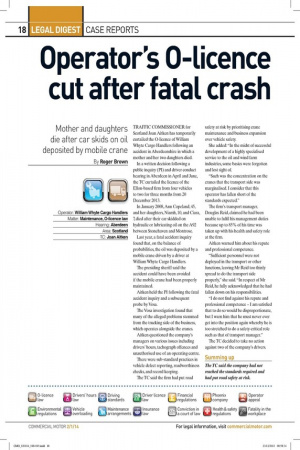Operator's 0-licence cut after fatal crash
Page 15

If you've noticed an error in this article please click here to report it so we can fix it.
Mother and daughters die after car skids on oil deposited by mobile crane By Roger Brown
TRAFFIC COMMISSIONER for Scotland Joan Aitken has temporarily curtailed the 0-licence of William Whyte Cargo Handlers following an accident in Aberdeenshire in which a mother and her two daughters died.
In a written decision following a public inquiry (PI) and driver conduct hearing in Aberdeen in April and June, the TC curtailed the licence of the Ellon-based firm from four vehicles to two for three months from 20 December 2013.
In January 2008, Ann Copeland, 45, and her daughters, Niamh, 10, and Ciara, 7 died after their car skidded on hydraulic or lubricating oil on the A92 between Stonehaven and Montrose.
Last year, a fatal accident inquiry found that, on the balance of probabilities, the oil was deposited by a mobile crane driven by a driver at William Whyte Cargo Handlers.
The presiding sheriff said the accident could have been avoided if the mobile crane had been properly maintained.
Aitken held the PI following the fatal accident inquiry and a subsequent probe by Vosa.
The Vosa investigation found that many of the alleged problems stemmed from the trucking side of the business, which operates alongside the cranes.
Aitken questioned the company's managers on various issues including drivers' hours, tachograph offences and unauthorised use of an operating centre.
There were sub-standard practices in vehicle defect reporting, roadworthiness checks, and record keeping. The TC said the firm had put road
safety at risk by prioritising crane maintenance and business expansion over vehicle safety.
She added: "In the midst of successful development of a highly specialised service to the oil and wind farm industries, some basics were forgotten and lost sight of.
"Such was the concentration on the cranes that the transport side was marginalised I consider that this operator has fallen short of the standards expected."
The firm's transport manager, Douglas Reid, claimed he had been unable to fulfil his management duties because up to 85% of his time was taken up with his health and safety role at the firm.
Aitken warned him about his repute and professional competence.
"Sufficient personnel were not deployed in the transport or other functions, leaving Mr Reid too thinly spread to do the transport side properly," she said. "In respect of Mr Reid, he fully acknowledged that he had fallen down on his responsibilities.
"I do not find against his repute and professional competence — I am satisfied that to do so would be disproportionate, but I warn him that he must never ever get into the position again whereby he is too stretched to do a safety-critical role such as that of transport manager."
The TC decided to take no action against two of the company's drivers. Summing up
The TC said the company had not reached the standards required and had put road safety at risk.












































